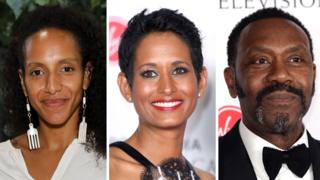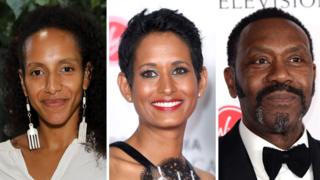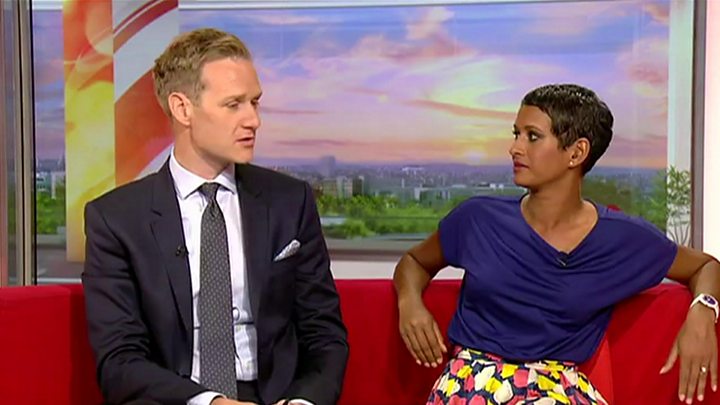BBC urged to reconsider Naga Munchetty complaint decision
More than 40 broadcasters sign an open letter objecting to the BBC ruling on Naga Munchetty. …

 Image copyright Getty Images
Image copyright Getty Images More than 40 presenters, actors and broadcasters have signed an open letter calling on the BBC to overturn its decision to uphold a complaint against Breakfast host Naga Munchetty.
Sir Lenny Henry, Adrian Lester and Gina Yashere are among those who have put their names to the letter.
It objects to the BBC ruling about remarks Munchetty made about US President Donald Trump in July.
The BBC’s editorial standards boss said there was “a lot of misunderstanding”.
Munchetty was found to have breached guidelines by criticising President Donald Trump after he said four female politicians should “go back” to “places from which they came”. But she is not facing any disciplinary action or reprimand.
Writer Afua Hirsch, who helped organise the letter, told BBC Radio 4 the decision would have “a chilling effect on other broadcasters of colour”.
‘Shocked and horrified’
The signatories, who also include actor David Harewood, Sky journalist Gillian Joseph, journalist Marcus Ryder and film-maker Asif Kapadia, demand that the BBC “revisits and takes seriously overturning its decision”.
It calls for BBC management to “issue their support for journalists and acknowledge there can be no expectation of ‘impartiality’ over expressions and experiences of racism”.
It also wants the bodies that oversee complaints about broadcasting, including the BBC’s Editorial Complaints Unit and Ofcom, to “address their own levels of diversity and increase transparency as to how they reach their decisions”.
Hirsch said she was “shocked and horrified” by the BBC’s ruling, telling BBC Two’s Victoria Derbyshire programme: “It’s ludicrous to say it’s fine for a presenter to express her own experience of racism but she shouldn’t cast judgment on the person being racist.”
She also told the Today programme: “As a matter of principle, it [the BBC decision] suggests that the racist views she was commenting on are opinions that should be treated impartially, and that really legitimises racism and suggests it’s something we should debate.
“That’s clearly wrong and it’s widely accepted that racism is not a legitimate opinion, so I think the BBC has got confused by treating it that way.”
She added that the decision was “abhorrent”, and that it had “a highly disproportionate and unacceptable impact on people of colour in broadcasting, because it distributes the labour of having to challenge racism unequally”.
What did Naga Munchetty say?

Media playback is unsupported on your device
Munchetty and BBC Breakfast co-presenter Dan Walker had the exchange after an interview with a supporter of Mr Trump on 17 July.
Walker: It’s the president. That was the most telling quote for me last night. I can’t remember who said it, but she said, ‘I’ve been told to go home many times to go back to where I’ve come from in my life, but never by the man sitting in the Oval Office’.
Munchetty: Every time I have been told, as a woman of colour, to go back to where I came from, that was embedded in racism. Now I’m not accusing anyone of anything here but you know what certain phrases mean.
Walker: Do you hear that quite regularly?
Munchetty: Yes. Not regularly, but I’ve been told it.
Walker: You’re sitting here not giving an opinion, but how do you feel as someone when you’ve been told that before, and when you hear that from him?
Munchetty: Furious. Absolutely furious. And I imagine a lot of people in this country will be feeling absolutely furious that a man in that position feels it’s OK to skirt the lines with using language like that.
Walker: Do you feel his use of that then legitimises other people to use this…
Munchetty: Yes. Yes.
Walker: It feels like a thought-out strategy to strengthen his position.
Munchetty: And it is not enough to do it just to get attention. He’s in a responsible position. Anyway I’m not here to give my opinion.
Why did that break the BBC rules?
David Jordan, the BBC’s head of editorial standards, said Munchetty was not found in breach for “calling out racist comments, which is perfectly acceptable where things are clearly framed in racist language”.
The “issue” on which the BBC finding was made was “not her responding to that clearly racist comment, or responding personally to what it’s like as a person of colour to have a remark of that nature directed against yourself”, he explained.
He said the issue arose “when she went on further to discuss President Trump himself, what his motivations were for that, and that breached our impartiality requirements”.
- BBC gives more detail on Naga Munchetty ruling
- Naga Munchetty ‘breached BBC rules’ with Trump comments
He added: “It’s about how you go on then to discuss the person that made them, and make assumptions or remarks about that.”
The broadcaster’s complaints unit found it was “entirely legitimate” for Munchetty to reply to Walker in terms which reflected her own experience of racism and the racist context in which people from ethnic minorities are told to go back to their own countries.
But it said she went on to comment critically on the possible motive or consequences of Mr Trump’s words but “judgements of that kind are for the audience to make”.
What do the BBC editorial guidelines say?
The guidelines say presenters can have a “significant effect” on whether the corporation is seen as impartial. Mr Jordan said Munchetty fell foul of the following part of the impartiality section of the guidelines:
“Our audiences should not be able to tell from BBC output the personal opinions of our journalists or news and current affairs presenters on matters of public policy, political or industrial controversy, or on ‘controversial subjects’ in any other area.
“They may provide professional judgements, rooted in evidence, but may not express personal views on such matters publicly, including in any BBC-branded output or on personal blogs and social media.”
Support for Munchetty
The presenter has received widespread support, including from political figures including Chancellor of the Exchequer Sajid Javid and Labour leader Jeremy Corbyn.
Actors Meera Syal and Sanjeev Bhaskar also added their support for the presenter.
The BBC’s spokeswoman said Munchetty was not available for comment.
Follow us on Facebook, or on Twitter @BBCNewsEnts. If you have a story suggestion email entertainment.news@bbc.co.uk.




